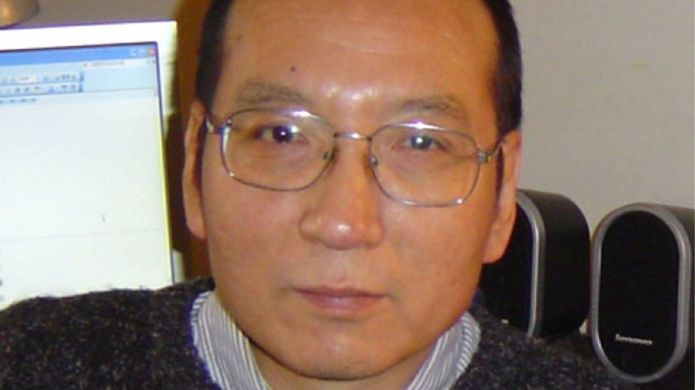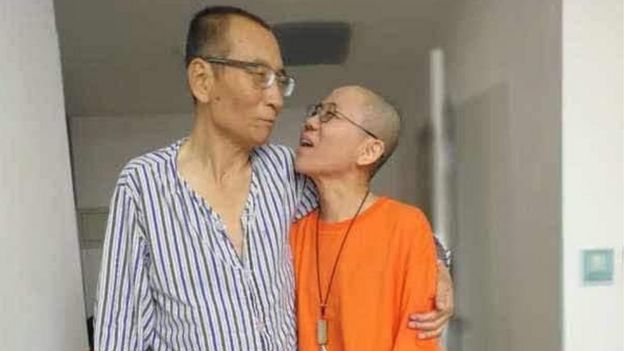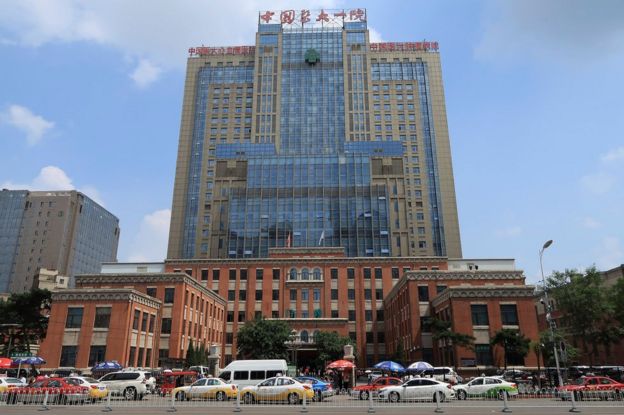A Tale of Two Trumps
I've not heard any public statements from Donald Trump about the treatment of the Chinese dissident Liu Xiabo who is suffering from terminal cancer after being jailed for the 'crime' of calling for greater human rights and democracy in China.
Yet Mr Trump has made great play about his 'support' for the terminally ill baby, Charlie Gard, who has been under the care of the world renowned Great Ormond Street Hospital in London for months, after being diagnosed with catastrophic and irreversible brain damage.
Liu Xiaobo: German anger at China over hospital videos
BBC China

Image copyright - AFP/GETTY IMAGES Image caption - Mr Liu is currently being treated in a hospital in China for liver cancer
Germany has issued a sharp rebuke to China after videos of Western doctors visiting ailing Chinese dissident Liu Xiaobo in hospital were posted online.
The German embassy in Beijing posted a statement accusing China of recording the visit against its wishes. One of the doctors was German.
The statement adds that Chinese security services, rather than doctors, are steering the dissident's treatment.
The Chinese authorities are yet to respond to the German statement.
Nobel peace laureate Liu Xiaobo was serving a sentence of 11 years for subversion, but was moved from prison to a hospital last month with terminal liver cancer.
Who is Chinese dissident Liu Xiaobo?
The love that survived a Chinese labour camp
Liu Xiaobo: 20 years of activism
What is China accused of?
Following international pressure, Beijing allowed two doctors - Markus Büchler from Germany and Joseph M Herman from the US - to examine the dissident in the north-eastern Chinese city of Shenyang.
Over the weekend the doctors said he could go abroad for palliative care, directly contradicting Chinese medical experts who said previously that Mr Liu is too ill to travel.
What do the videos show?
There are at least two known video clips which were first posted online on Sunday by Chinese government-backed groups.
One video appears to shows the two Western doctors at Mr Liu's bedside, along with his wife Liu Xia as well as several Chinese doctors and nurses.
A second video, which Chinese state news outlet Global Times later republished on its website, appears to show the Western and Chinese doctors in a conference room.
In the first clip, a man thought to be Dr Büchler says the Chinese doctors are "very committed" to treating Mr Liu, while in the second he is heard saying: "I don't think we can do better medically than you do".
The videos have been met with some scepticism from Chinese-language news outlets and blogs outside of mainland China.
Some claim the recordings were edited to cast the Chinese doctors in a positive light and lend credence to Beijing's argument that Mr Liu is too ill to be medically evacuated.
The fact that the videos were first posted on YouTube - which is blocked in China - has also prompted speculation that they were intended for a foreign audience.
What does Germany say?
Late on Monday, the German embassy in Beijing released a statement accusing "certain authorities" of making audio and video surveillance recordings of the visit, and then leaking them "selectively to certain Chinese state media outlets".
This, they said, constituted a breach of doctor-patient confidentiality.

Image copyright EPA Image caption - Liu Xiaobo (left) is seen here with his wife Liu Xia (right) in this undated photo
The recordings were also "made against the expressed wishes of the German side, which were communicated in writing" before the visit.
"It seems that security organs are steering the process, not medical experts. This behaviour undermines trust in the authorities dealing with Mr Liu's case, which is vital to ensure maximum success of his medical treatment."
Separately, Mr Liu's lawyer Jared Genser told the BBC that it was "unfortunate and unsurprising that the Chinese government would be engaged in surveilling anybody who is having contact with Liu Xiaobo and Liu Xia".
The recordings were also "made against the expressed wishes of the German side, which were communicated in writing" before the visit.
"It seems that security organs are steering the process, not medical experts. This behaviour undermines trust in the authorities dealing with Mr Liu's case, which is vital to ensure maximum success of his medical treatment."
Separately, Mr Liu's lawyer Jared Genser told the BBC that it was "unfortunate and unsurprising that the Chinese government would be engaged in surveilling anybody who is having contact with Liu Xiaobo and Liu Xia".
What has China said?
There has been no official response to the statement but on Monday China's foreign ministry said it "hopes relevant countries will respect China's sovereignty and will not use individual cases to interfere with China's internal affairs", when asked if Liu Xiaobo would be allowed to leave.
A Global Times editorial on Monday said Chinese authorities were "trying their best to treat Liu and have fulfilled their humanitarian obligations".
It accused foreign forces of "still squeezing Liu for their political goals in disregard of his critical condition".
What is Mr Liu's condition?
Liu Xiaobo, who won the Nobel Peace Prize in 2010, is said to be in critical condition. Last week the hospital said his liver functions were worsening.

Image copyright - REUTERSImage caption - Mr Liu is being treated at a hospital in the north-eastern Chinese city of Shenyang
Mr Genser has called for his immediate medical evacuation.
He told the BBC: "My view is that China could demonstrate itself to be a strong power, and one that is secure by allowing him to travel abroad for medical treatment."
"Instead, they seem to be afraid of this one man and his views on how China could evolve from being a single party system to being a multi-party democracy," he said.
Mr Genser has called for his immediate medical evacuation.
He told the BBC: "My view is that China could demonstrate itself to be a strong power, and one that is secure by allowing him to travel abroad for medical treatment."
"Instead, they seem to be afraid of this one man and his views on how China could evolve from being a single party system to being a multi-party democracy," he said.

